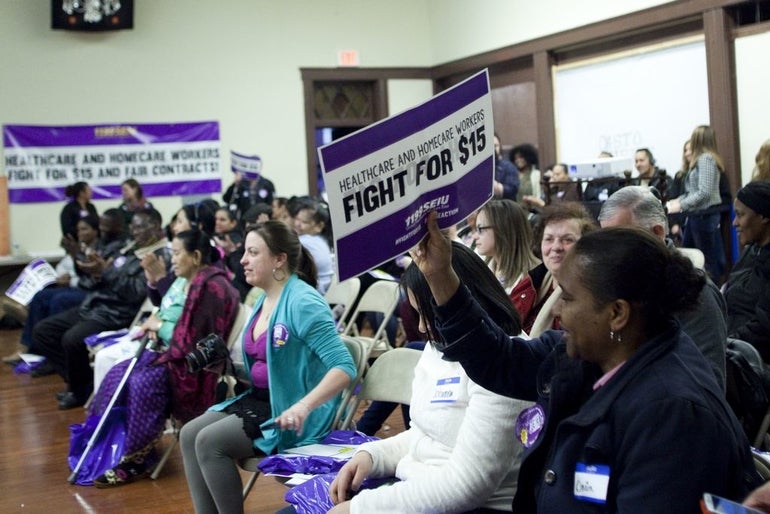Who earns more money: a health care worker or a fast-food worker?
It depends on where they work. Fast-food workers were famously victorious in Seattle when they got the city to adopt a $15-per-hour minimum wage, a gradual increase that begins this year. That was done under the union-backed “Fight for $15,” which launched in 2012. Since then, low-wage workers from other sectors have joined the cause, including healthcare workers, who in Massachusetts sometimes earn only the state’s minimum wage of $9 per hour.
Forums precede April demonstration in Boston
Fight for $15 arrived in Worcester last night, when 1199SEIU (Services Employees International Union), which represents 400,000 health care workers in Massachusetts, Florida, New York, New Jersey, Maryland and Washington, D.C., hosted a forum promoting a $15 minimum wage for health care workers at the Rock of Salvation Pentecostal Church on Main Street.
The event is one of five planned throughout the state before 1199SEIU’s planned Boston rally on April 14 to promote the cause. Other rallies will take place throughout the country on April 15, but the Massachusetts event was planned for the previous day out of respect for the 2nd anniversary of the Boston Marathon bombings, said 1199SEIU spokesman Jeff Hall.
Hall said about 100 home health and nursing home workers, such as certified nursing assistants (CNAs) and personal care aides, would “throw their hat in the ring” in the “Fight for 15” campaign at Tuesday night’s event. This comes ahead of what Hall said is likely the largest round of nursing home contract negotiations the state has ever seen, because contracts at facilities across the state happen to be expiring at the same time this year, and more nursing home workers have joined the SEIU.
In addition to nursing home workers, a large group of personal care aids joined the SEIU in 2008. Hall said these unionized workers, and their non-union counterparts, often have trouble paying for basic necessities, such as fuel for heat in winter, because they don’t earn a living wage. The1199 SEIU cites a February brief by the National Employment Law Project that found nearly have of America’s home health workers receive some form of public assistance, and earned median annual wages of $18,598 in 2013.
The campaign has been successful for workers employed at a handful of Boston-area health care agencies, with which they’ve contracted starting rates of $15 per hour.
Because of the way the Massachusetts constitution is written, municipalities can’t implement ordinances mandating a certain minimum wage, according to Hall, so contracting with employers piecemeal is the preferred route in the Bay State.
Can employers afford it?
But many health care agencies will likely be loath to embrace a starting wage of $15. While the demand for health care workers, especially home health and personal care aides, is higher than that of nearly all other industries both nationally and at the state level, the business isn’t that lucrative. That’s because reimbursements from federal and state payers, which make up the bulk of coverage for people in need of nursing home or home health care, is low compared to reimbursements of other types of health care services.
This is true for Holy Trinity Nursing and Rehabilitation Center in Worcester, which provides nursing home care to about 113 patients.
“If you look at most nursing homes like ours, about 80 percent of patients are covered by Medicaid,” said Jim Divver, administrator at Holy Trinity. “And Medicaid doesn’t pay its fair share.”
Holy Trinity doesn’t have a unionized workforce, so the agency won’t have to negotiate with SEIU members. But according to 1199SEIU, more than 24 nursing home facilities throughout Massachusetts will be vying for the $15 minimum wage, and Hall said that will put pressure on all agencies to increase their wages.
There’s pressure outside the Fight for $15 too. Divver noted that Holy Trinity and others already boosted wages this year for some workers, such as CNAs, housekeeping and dietary staff, in order to comply with the state’s new minimum wage law, which will boost the wage to $11 per hour by 2017. Plus, he said, there are so many places for people to work that retaining employees is a constant battle, and one that requires competitive pay. According to Divver, an industry veteran, Greater Worcester alone is home to 21 nursing homes, and he said the state is “flooded” with home health agencies.
“It’s not like you have a captive audience,” Divver said.
To help agencies bear the cost of competitive wages that are adequate for workers to meet their needs, reform to the Medicaid reimbursement system is needed, according to Sen. Harriette Chandler, D-Worcester, who planned to attend Tuesday’s rally. Chandler said it’s been a struggle, but the legislature has gradually been able to increase the state’s Medicaid reimbursements to nursing homes so that caring for Medicaid patients is less costly.
Today, Chandler said nursing homes and other agencies that deliver long-term care for Medicaid-eligible patients lose $37 per day. Rates are stuck at 2007 levels; a proposal to bring them to 2011 levels last year was cut by then-Gov. Deval Patrick, Chandler said.
“We want to raise the rates so that we can make sure the nursing homes and home care agencies are not in a positon where they’re losing money, and frankly, we shouldn’t be doing it on the backs of (the workers),” Chandler said.

